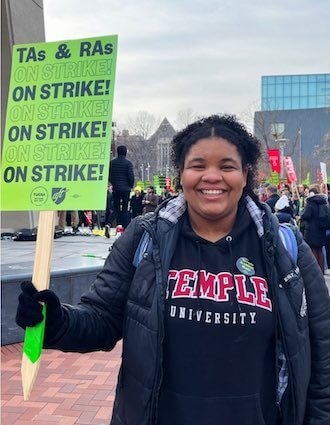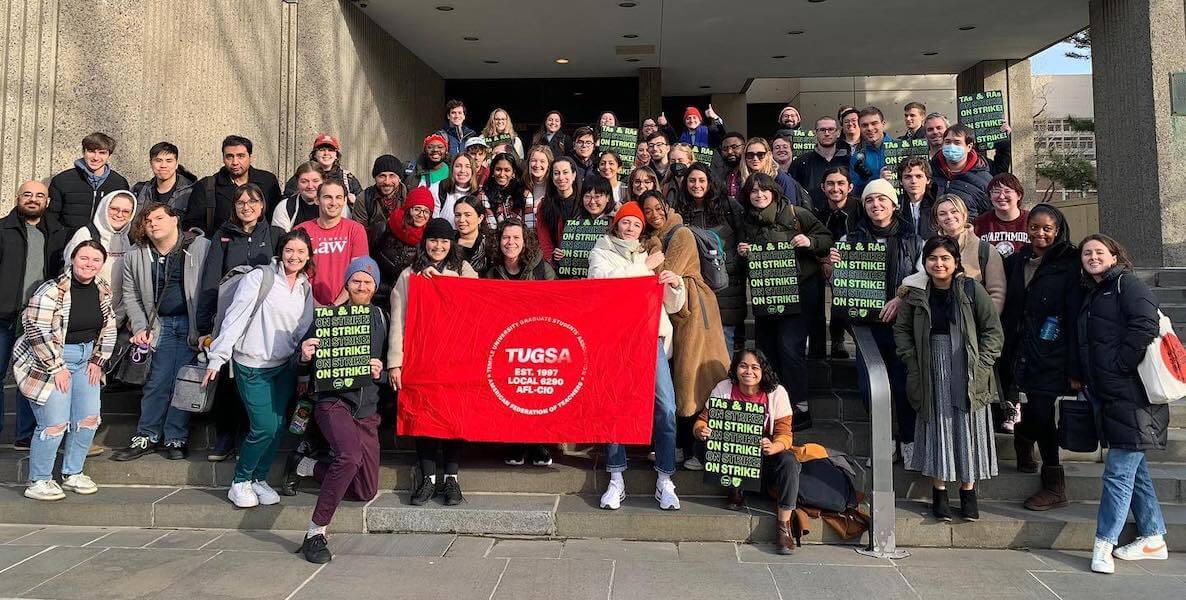On February 15, 1,000 undergraduates walked out of Temple University classrooms in support of striking graduate students. The Philadelphia Inquirer reported one sophomore’s comment:
“They [the graduate students] teach us more than the professors do,” said Sadaisa Jordan. “They should get what they deserve.”
Sadaisa Jordan has brought us to the heart of the matter. Too many universities, Temple included, depend on the services of overworked and under-compensated graduate students to do too much of the teaching, especially in first and second-year undergraduate courses.
The previous day, the Inquirer reported, “The average pay for a teaching and research assistant at Temple is $19,500 a year, and the union has sought to raise it to over $32,000, an increase that it said is a necessary cost-of-living adjustment. The university’s offer of 3 percent raises over the four-year contract gets the average pay to about $22,000 in 2026.” In addition, the Temple University Graduate Student Association (TUGSA) is asking for expanded parental leave and affordable family health care.
Many universities — not just Temple — pay graduate student instructors significantly less than full-time professors. But to my mind, that’s false economy.
Temple says that meeting graduate students’ demands would not be fiscally responsible. In other words, they don’t have the money, given post-pandemic enrollment declines.
The over-dependence on graduate students for instruction is justified by what is a misleading financial analysis. Many universities — not just Temple — pay graduate student instructors significantly less than full-time professors. But to my mind, that’s false economy.
The whole system is broken, and no one really benefits. Graduate students remain in apprentice roles for far too long. Undergraduates are taught by dedicated but exhausted instructors. Universities, while ostensibly saving money by paying low wages to graduate students, lose in the end because they are not sufficiently investing in freshman and sophomore courses. These courses, the foundation of further study, should motivate students to continue their education. Not investing in these courses leads to students dropping out, negatively affecting overall university enrollment.
How universities should treat graduate students
As employees, graduate students provide valuable services in teaching and research. But graduate students are also students. They are a strange hybrid who live in limbo — with the responsibilities but not the protections of full-time professorial employees. As students, who are learning on the job, they at the very least deserve the protections provided to students. For that reason, I was infuriated by Temple’s abrupt removal of healthcare benefits.
The deeper problem is the amount of time universities expect graduate students to remain in this limbo state. I would argue that graduate education, especially in the humanities and social sciences, should extend no more than four to five years. During that period, universities should offer a structured program of courses and apprentice experiences. This can be done and has been done.
My own PhD preparation in English at the University of Pennsylvania provides a great model. Several decades ago, I was a member of a specially selected group of graduate students, funded by the Ford Foundation and the National Defense Education Act. In our first year, we took a full load of courses. In our second year, we continued with courses but also observed and assisted a full-time professor teaching first-year composition.

I was lucky. My professor took his mentoring role seriously. For example, he and I separately graded student papers and then discussed our assessments. By the third year of the program, I was well prepared to teach my own two sections of Freshman Composition, while I worked on my dissertation. During the fourth year, I continued writing my dissertation, completing my PhD four-and-a-half years after I started.
Oh, by the way, I also got married and gave birth to my first child during this four-and-a-half-year period.
I was then able to leave the limbo of graduate school and apply for jobs as an Assistant Professor of English.
I don’t know of any university, including Penn, that still uses that excellent model of graduate instruction. Some universities come closer than others. More universities should reexamine PhD education and develop structured programs that do not involve decades of indentured servitude by graduate students.
What the public can do
In the short term, encourage the Commonwealth of Pennsylvania to provide sufficient funding to universities to pay graduate students a living wage for their teaching.
In the long term, encourage universities to rethink graduate education to provide structured experiences enabling students to complete apprentice work in four to five years.
In general, make sure that first and second-year undergraduates interact with graduate students who are excited about their classroom work and with full-time professors who understand the importance of the freshman and sophomore year.
Elaine Maimon, Ph.D., is the author of Leading Academic Change: Vision, Strategy, Transformation. Her co-authored book, Writing In The Arts and Sciences, has been designated as a landmark text. She is a Distinguished Fellow of the Association for Writing Across the Curriculum. Follow @epmaimon on Twitter.
![]() MORE FROM ELAINE MAIMON ON EDUCATION
MORE FROM ELAINE MAIMON ON EDUCATION



